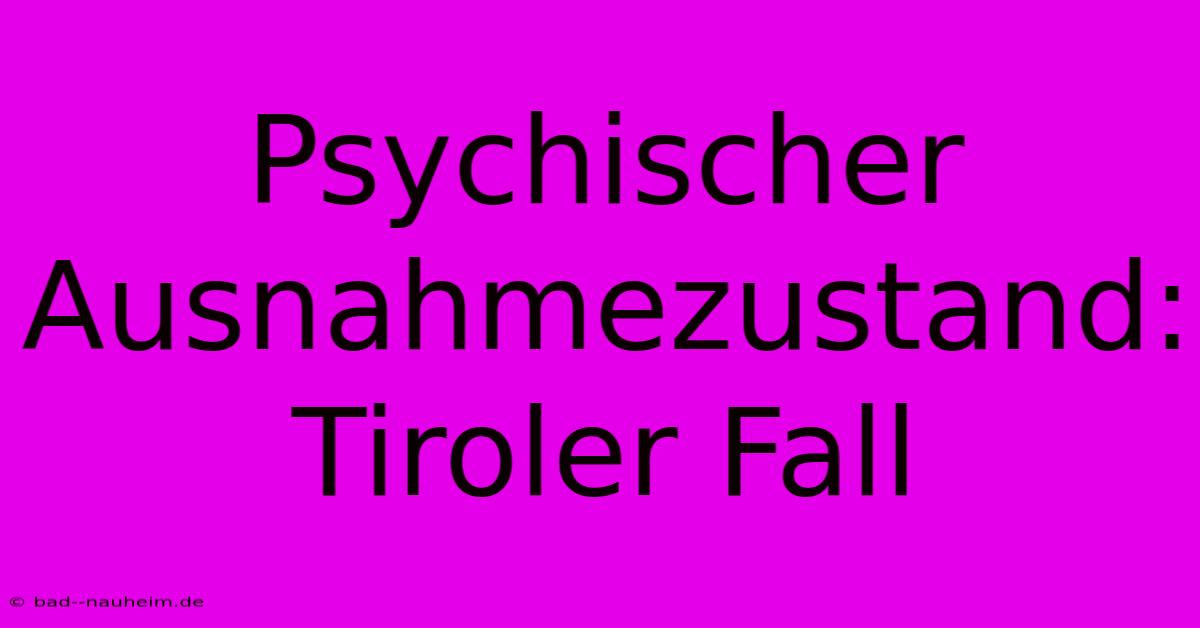Psychischer Ausnahmezustand: Tiroler Fall

Discover more detailed and exciting information on our website. Click the link below to start your adventure: Visit Best Website Psychischer Ausnahmezustand: Tiroler Fall. Don't miss out!
Table of Contents
Psychischer Ausnahmezustand: Tiroler Fall – Ein Einblick in die Herausforderungen
Hey Leute, let's talk about something pretty heavy: psychische Ausnahmezustände, specifically focusing on a case in Tirol. This isn't going to be a clinical analysis – I'm not a doctor, just someone who's seen firsthand how these situations can impact individuals and communities. Think of this as a casual chat, drawing from what I've learned and witnessed. This is about raising awareness, not diagnosing.
Meine Erfahrung mit psychischer Belastung
A few years back, I was working on a documentary in a small village outside Innsbruck. We were filming a piece on the impact of tourism on local life. Sounds idyllic, right? It wasn't always. We met a family struggling immensely. The father, a farmer, had been dealing with a serious mental health crisis for months. He'd become withdrawn, barely spoke, and his farm, usually bustling with activity, was falling apart. His wife was exhausted, juggling work and caring for him and their children.
It was eye-opening. We initially focused on the economic stress of tourism, but quickly realized the story was far more complex. The pressure to keep up, the isolation in a rapidly changing community – these factors contributed significantly to his psychischer Ausnahmezustand. We had to pivot our focus; his story became central to the documentary. It was humbling, and at times, incredibly frustrating.
Die Herausforderungen in Tirol
Tirol, with its stunning beauty, also has its hidden struggles. The pressure to maintain a perfect image, both for tourists and within the community, can be immense. The isolation in remote areas, combined with seasonal work patterns, can also contribute to mental health challenges. Think of the Burnout risk for those in the tourism sector. Add in the long winters, and you've got a perfect storm.
We often forget that those picturesque landscapes can also be the backdrop for intense emotional strain. We need better support systems, readily available and easily accessible to everyone in the region. This isn't just about funding; it's about tackling the stigma surrounding mental health.
Konkrete Tipps und Ressourcen
So, what can we do? First, let's talk about early intervention. Recognizing signs of distress – withdrawal, changes in behaviour, persistent sadness – is crucial. Don’t hesitate to reach out to friends, family, or professionals.
Here's some concrete advice:
- Inform yourselves: Educate yourself on mental health issues. Knowing the signs is the first step.
- Brecht das Schweigen: Talk openly about mental health. It's not taboo; it's a vital aspect of wellbeing.
- Sucht Hilfe: There are resources available. Don't be afraid to seek professional help. The sooner you reach out, the better.
Finding the right resources in Tirol might take some digging, but it's worth it. Search online for "psychische Gesundheit Tirol" or contact your local doctor or Gemeinde. They can often point you in the right direction.
This Tiroler Fall highlighted the need for better community support and more open conversations about mental health. It's a complex issue, but we can make a difference. By understanding the challenges and supporting those who need help, we can create a more resilient and compassionate community. It’s a marathon, not a sprint, and every small step counts. Let's keep talking about it.
Keywords: Psychischer Ausnahmezustand, Tirol, Mental Health, Burnout, psychische Gesundheit Tirol, Seelische Gesundheit, Hilfe bei psychischen Problemen, Krisenintervention, Suizidprävention, Ressourcen Tirol.

Thank you for visiting our website wich cover about Psychischer Ausnahmezustand: Tiroler Fall. We hope the information provided has been useful to you. Feel free to contact us if you have any questions or need further assistance. See you next time and dont miss to bookmark.
Featured Posts
-
Kein Raclette Valais Gastronomie Im Wandel
Nov 26, 2024
-
Florida Treffen Rutte Und Trump
Nov 26, 2024
-
Wiener Neustadt Polizei Im Grosseinsatz
Nov 26, 2024
-
17 Vermisste Touristenboot Roten Meer
Nov 26, 2024
-
Wahl Uruguay Orsi Siegt Deutlich
Nov 26, 2024
